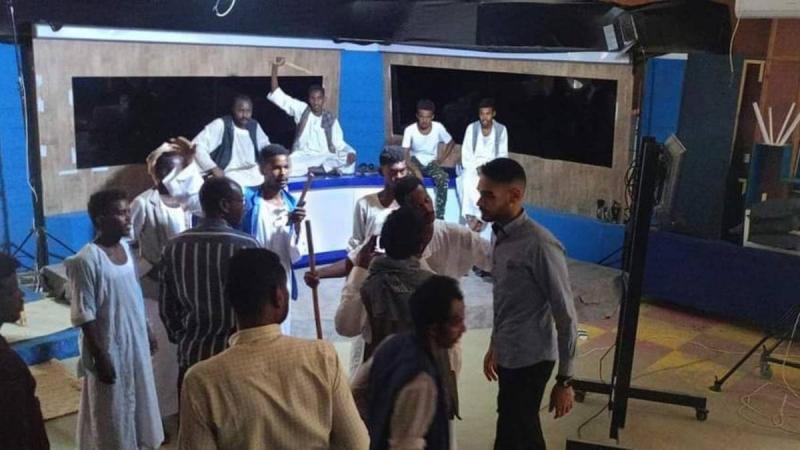A group of angry members from the Beja tribes in eastern Sudan stormed the headquarters of the Broadcasting and Television Authority in Port Sudan with swords and sticks, halting live broadcasts. They accused the television director of refusing to allow one of the station's presenters (from their tribe) to appear in her traditional tribal attire, threatening her with dismissal, which they considered a form of contempt.
The Higher Council of the Beja Tribal Leadership, led by Mohamed Amin, known as "Tirk," who is close to military leaders, issued a furious statement regarding the incident, giving the "acting" Minister of Information 24 hours to remove the television director, Ibrahim Al-Bazai, from his position. The council viewed the television director as "a promoter of division and discord," stating that he only represented himself.
Protesters inside the television studios shouted slogans celebrating their tribe, stating, "Beja Steel... Beja State," demanding the immediate dismissal of the television director and the appointment of the presenter as his replacement. However, the television authority clarified in a statement from its director that he had expressed concerns about presenter Zainab Eir's greeting in "Beja" language, which was interpreted as a rejection of the tribal identity and culture of this presenter.
They denied the statements attributed to the director, confirming that "the discussion took place four months ago" and contained no offense to any tribal component. The National Broadcasting and Television Authority moved broadcasting from Port Sudan after the "Rapid Support Forces" took control of the main headquarters in Omdurman (one of the cities in the capital Khartoum), and despite the army regaining control of the headquarters, it continued operations from the city.
The presenter confirmed in a video recording circulated on social media that the television authority's director threatened her with dismissal over her choice of "attire." After considering the matter intentional, she noted that he refused to apologize for his actions, prompting her to seek support from her tribe.
The incident has ignited a crisis regarding identity and marginalization experienced by large population groups in Sudan, which is known for its ethnic diversity. Beja women are known for wearing the "fouta," a dress complemented with ornaments for hair decoration, while men wear Sudanese jalabiya, a shoulder cloak, and long trousers.
Former Secretary-General of the Press and Publications Council, Hosam al-Din Haider, stated that the director’s objection to the presenter’s "attire" was a mistake, explaining the tribal component's reaction by storming the television headquarters as a result of the polarization affecting the components of eastern Sudan, which drives some to react so harshly.
Haider noted that the absence of a state in Sudan leads to appointments and dismissals made without the basis of professionalism and competence, tied to the interests of certain entities in the ruling powers of Port Sudan. Social media users strongly criticized the television director's decision, arguing he leads a national body that should respect and reflect the cultural and ethnic diversity of the country.
The Beja tribes in eastern Sudan had proposed, prior to the outbreak of war between the Sudanese army and the "Rapid Support Forces" in April, a vision for implementing a federal governance system in Sudan that grants the eastern region self-governance with full sovereignty and independence in managing its resources and shaping its future.




